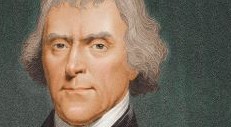
What was this founding father’s position?
What was Thomas Jefferson’s position on the proposed Constitution? Would he have been a Federalist or Anti-Federalist? It is easier to define his political leanings at the end of his career, but as the Constitution was drafted, debated, and ratified, where did he stand? Read the brief essay and answer the questions at the bottom of this page.
Thomas Jefferson was notably absent from the Constitutional Convention. Stationed in Paris as ambassador to France, Jefferson was unable to participate in designing the new plan for union or to vocally push for or against ratification. Was he pro- or anti-Constitution during its formulation and ratification in real time? Would he have signed the Constitution on the convention’s final day in Philadelphia? Would he have voted to ratify the document had he been in the US?
This is not easy to answer because of Jefferson’s distance from the debate and his mixed emotions on the proposed system. The best evidence is found in his correspondence with James Madison and other leaders in the US and abroad. But even a full combing of the record Jefferson left behind leaves the curious historian wondering the role Jefferson would have played had he resided at his home Monticello 1787—89.
Some are tempted because of Jefferson’s desire for small-government, state’s rights, and protected liberties, to assume him an opponent of strengthening the central government and creating a national authority supreme to the states. Later partisan attacks labeled him a “foe” of the Constitution.
Madison and others mailed Jefferson copies of the proposed Constitution soon after the convention ended. Jefferson’s thoughtful and careful comments through letters reveal his cautious reservation about the new plan with his ultimate, practical acceptance. He certainly felt Shays’ Rebellion, one impetus for the convention, overplayed. “Our convention has been too much impressed by the insurrection of Massachusetts,” he said, and it was no reason to revamp the national structure. Jefferson also thought the secrecy rule for the Philadelphia gathering was a misjudgment, perhaps another reason he was incorrectly accused an Antifederalists. He thought the basic principles of the Articles of Confederation, “with all the imperfections…is without comparison the best existing [government] or that ever did exist.” He saw the Constitution as having “a bitter pill or two,” citing no guaranteed term limit or rotation for the presidency and no bill of rights.
By one account, he found the provisions 50 percent unfavorable. He certainly trusted the leaders in Philadelphia and their purpose, but told John Adams, serving as ambassador in London, “[T]here are things in it which stagger all my dispositions to subscribe to what such an Assembly has proposed.” He thought the necessary changes “might have been couched in three or four new articles to be added to the [existing Articles].”
What half did he favor? He liked the independence of the national government from the state legislatures, was “captivated” by the Great Compromise and bicameral legislature, and thought it necessary to grant the national government the power to tax and to regulate commerce.
Before the ratification debate ended, Jefferson decided the best course to agree with the new system in its basic form to establish a more sound government, and then to quickly correct any imperfections with amendments. We could sum up his mood that encouraged a nine-four strategy. “Were I in America,” he wrote a friend, “I would advocate it warmly till nine [states] should have adopted and then as warmly take the other side to convince the remaining four that they ought not to come into [the Union] till the declaration of rights is annexed to it.”
So in the end, Jefferson thought the new Constitution appropriate to improve the United States, but only on the condition that a firm Bill of Rights be added to secure individual and state liberties.
Questions For Completion
1.What was Thomas Jefferson’s position on whether the Constitution should be ratified or not? Be sure to identify at least two pieces of evidence from the text!
2. Thomas Jefferson was afraid of a lack of “rotation in office” in the legislative and executive branches. What does this mean? Do you think we would be better off if there was greater “rotation in office” in Congress? Why or why not?
3. The founding fathers met in secrecy when crafting the Constitution. As you read, Jefferson opposed this. What are the pros and cons of meeting in secrecy? What would you have recommended?